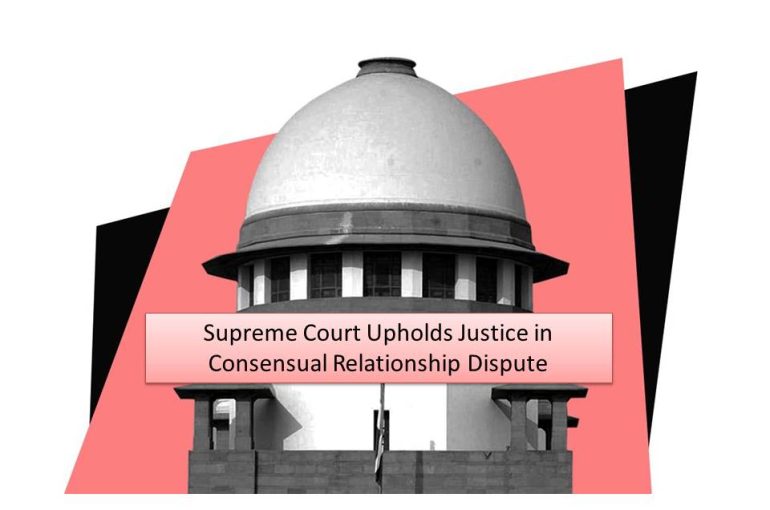Supreme Court Upholds Justice in Consensual Relationship Dispute
On November 20, 2024, the Supreme Court of India, in the case of Prashant v. State of NCT of Delhi, (2024 INSC 879) delivered a significant judgment addressing the misuse of criminal proceedings in consensual relationships, ultimately quashing the FIR against the Appellant. This judgment was rendered by a Two Judges Bench.
Background of the Case
The case originated from an FIR lodged by the Complainant on September 29, 2019, under Sections 376(2)(n) (rape) and 506 (criminal intimidation) of the Indian Penal Code (IPC). The Complainant alleged that the Appellant had engaged in a sexual relationship with her on the pretext of marriage and later refused to marry her. Additionally, the Appellant was accused of intimidating the Complainant and threatening her brother to coerce her into continuing the relationship.
The Appellant sought to quash the FIR in the Delhi High Court under Section 482 of the Code of Criminal Procedure (CrPC), arguing that the relationship was consensual and not coerced. However, the High Court dismissed the petition, leading to the present appeal in the Supreme Court.
Key Observations by the Supreme Court
1. Nature of the Relationship
The Court carefully examined the chronology of events and the nature of the relationship between the Appellant and the Complainant. It found:
- The relationship began in 2017 and lasted until 2019.
- The interactions between the parties, including frequent meetings, were voluntary and mutual.
- The allegations of coercion and criminal intimidation were inconsistent with the Complainant’s continued association with the Appellant over two years.
The Court held that the Complainant’s actions and the timeline of events reflected a consensual relationship rather than one predicated on deceit or force.
2. Application of Section 376(2)(n)
Section 376(2)(n) IPC pertains to repeated acts of rape on the same individual. However, the Court emphasized that for a charge under this section to be sustained:
- There must be evidence of lack of consent.
- A false promise of marriage must be shown to have induced the sexual relationship.
In this case, the Court found no indication of an initial or sustained false promise of marriage that vitiated the Complainant’s consent. The relationship appeared to be consensual from the outset, and the decision to marry was mutual but eventually did not materialize.
3. Criminal Intimidation
The Court found no substantial evidence supporting the claim of threats made by the Appellant. It reasoned that if criminal intimidation were indeed present, the Complainant would not have maintained the relationship for an extended period.
Legal Precedents Cited
The judgment drew extensively on prior Supreme Court rulings, including:
- State of Haryana v. Bhajan Lal 1992 Supp (1) SCC 335, outlining the principles for quashing criminal proceedings under Section 482 CrPC, particularly where proceedings are initiated with malicious intent.
- Pramod Suryabhan Pawar v. State of Maharashtra (2019) 9 SCC 608, which clarified that a false promise of marriage must be deliberate and intended to deceive for the act to constitute rape.
- XXXX v. State of Madhya Pradesh (2024) 3 SCC 496, reinforcing that consensual relationships, where both parties are aware of the consequences, do not constitute rape.
Ruling
The Supreme Court quashed the FIR and all related proceedings, citing a gross abuse of legal process. It held that:
- The allegations under Sections 376(2)(n) and 506 IPC were not substantiated by the evidence.
- Continuation of the trial would not serve the ends of justice but rather perpetuate harassment.
- Consensual relationships between adults, particularly where no false inducement is proven, should not be criminalized upon their breakdown.
Shikha
Associate
The Indian Lawyer & Allied Services
Editors Comments
This ruling reinforces the need for a cautious and nuanced approach in cases involving allegations of rape within the framework of consensual relationships. It underlined the principle that criminal law should not be used as a tool for retribution when relationships fail, provided both parties entered them with mutual consent and without deceit.
By setting this precedent, the Court has reaffirmed its commitment to protecting individuals from the misuse of criminal proceedings while ensuring that genuine instances of coercion and exploitation are addressed appropriately.
Sushila Ram
Advocate & Chief Consultant
If you are interested in learning more on “False Complaints” filed against a male member log on to our YouTube channel The Indian Lawyer Legal Tips and watch the episode on False Complaints on the link below:
https://youtu.be/0g8L1fJKTlY?si=5wXKqiFdHH3ZDAb0





































Leave a Reply